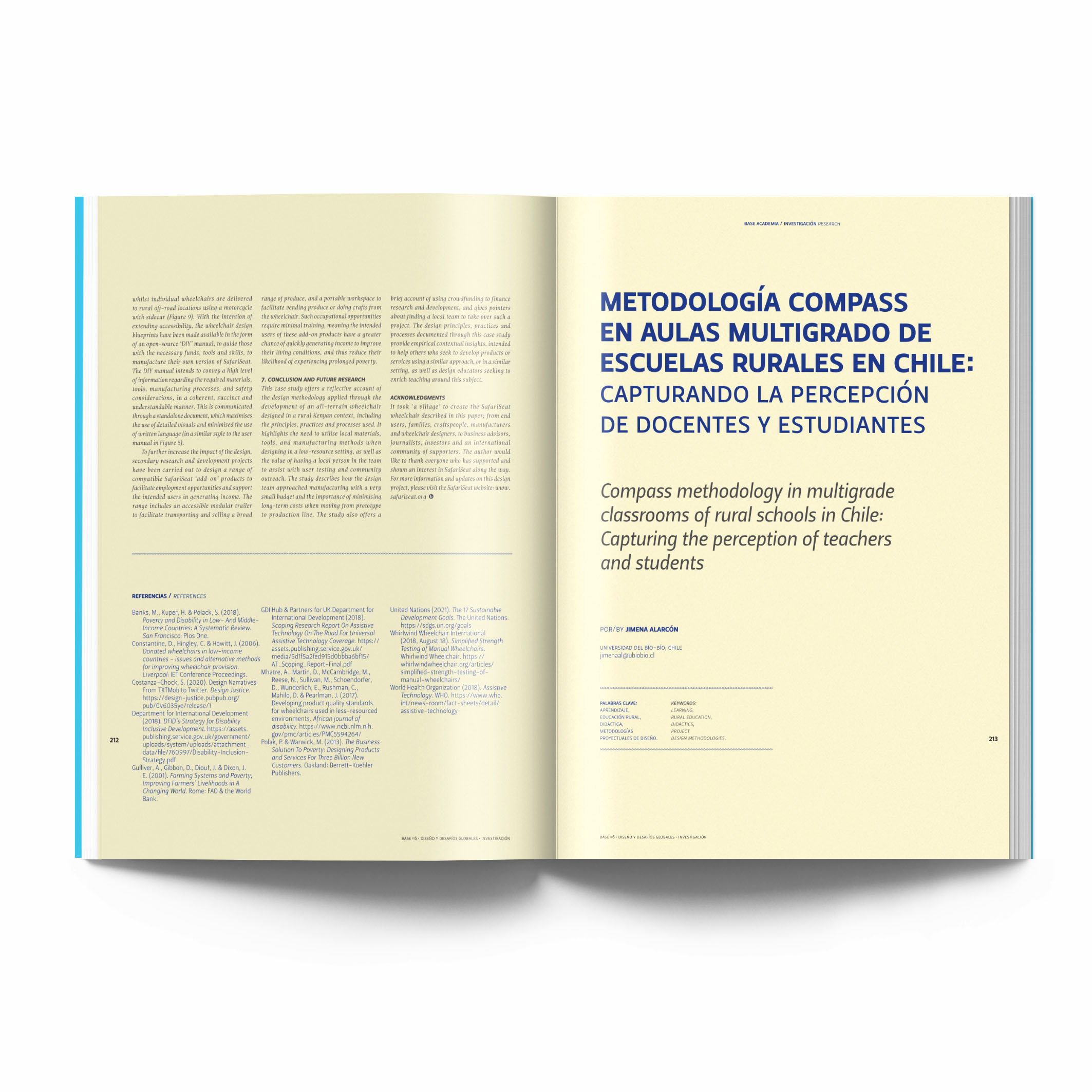Compass methodology in multigrade classrooms of rural schools in Chile Capturing the perception of teachers and students
Main Article Content
Abstract
The synergies between teaching and learning in rural school environments in Chile have focused on the correlation between students' cognitive achievements and lecture type classes implemented by teachers. In this dynamic, those who impart knowledge have an active role, while students are passive recipients. This modality presents weaknesses for the integral development of individuals in the formative stage, due to the limited possibilities of systematic participation. The objective of the research is to register the perception of students and teachers of rural primary schools, regarding the integration of the Compass© methodology of The Index Project, in multigrade classrooms. The methodological approach considers the realization of an educational experience that fuses contents of diverse subjects and contributes to the collaborative work of the project-based approach. Students ideate proposals to contribute to the betterment of their community, empathizing with the environment and its inhabitants. The results are based on perceptual assessments of the participants and show positive aspects derived from the project experience developed. The conclusions refer to the learning potential of the Compass methodology in rural schools with multigrade classroom, valuing collaborative and transversal work, in accordance to the resources of the territory.
Article Details
References
Abreu O, Gallegos M, Jácome J, Martínez R (2017) La Didáctica: Epistemología y Definición en la Facultad de Ciencias Administrativas y Económicas de la Universidad Técnica del Norte del Ecuador, Formación Universitaria, 10(3), 81-92. https://dx.doi.org/10.4067/S0718-50062017000300009
Abreu O, Rhea S, Arciniegas G, Rosero M (2018) Objeto de Estudio de la Didáctica: Análisis Histórico Epistemológico y Crítico del Concepto, Formación Universitaria, 11(6), 75-82. Recuperado de https://dx.doi.org/10.4067/S0718-50062018000600075
Agencia de Calidad de la Educación (2016) La autoestima académica y motivación escolar como predictor de la deserción en jóvenes vulnerables. Recuperado de: http://www.agenciaeducacion.cl/wp-content/uploads/2016/02/Estudio_Autoestima_academica_y_motivacion_escolar.pdf
Agencia de Calidad de la Educación (2018) Los desafíos para la nueva educación rural. Recuperado de: http://www.agenciaeducacion.cl/noticias/los-desafios-la-nueva-educacion-rural/
Alarcón J, Navarrete L, Bello P, Montecino R, Mardones N, González JP, Menezes M (2018) Integrating Design-based Learning methodologies in rural educational environments in Chile: a positive collaborative model at the head of the action! 11th annual International Conference of Education, Research and Innovation, ICERI2018 Proceedings, 8158-8167.
Álvarez C, San Fabián J (2012) La elección del estudio de caso en investigación educativa. Gazeta de Antropología, 28 (1), artículo 14. http://hdl.handle.net/10481/20644
Ausubel D (1983) Psicología educativa: un punto de vista cognoscitivo. México D.F.: Trillas. 2a ed. 623 pp.
Colunga S, García J (2005) Algunas variantes de concreción de los modelos teóricos: las estrategias, las metodologías y los programas de intervención educativa. Camagüey: Universidad de Camagüey.
Deci E, Vallerand R, Pelletier L, Ryan R (1991) Motivation and education: The self-determination perspective. Educational psychologist, 26(3-4), 325-346.
Dirección de Estudios Sociales UC (DESUC) y Centro de Políticas y Prácticas en Educación (CEPPE) (2015) Estudio encuesta nacional de percepciones, opiniones y actitudes de sostenedores, equipos directivos y docentes sobre la marcha blanca del sistema de aseguramiento de calidad de educación: fase implementación ordenación, Santiago: Pontificia Universidad Católica de Chile. 26 pp.
Duckworth A, Yeager D (2015) Measurement Matters: Assessing Personal Qualities Other Then Cognitive Ability for Educational Purposes. Educational Researcher, 44(4), 237–251.
Gueldner B, Feuerborn L, Merrell K (2020) Social and emotional learning in the classroom: Promoting mental health and academic success. Guilford Publications. 268 pp.
González I (2010) Specific Didactics Prospective, an area of the Science of Education for Effectiveness in the Classroom, Perspectiva Educacional, 49(1), 1-25.
INDEX (2012) Design to Improve Life Education. Teacher’s guide. Denmark: INDEX.
Madrid D, Mayorga M (2010) ¿Didáctica General en y para Educación Social? Puntos de encuentro desde la perspectiva del alumnado, Revista Educación Siglo XXI, 28(2), 245-260. Recuperado de http://revistas.um.es/educatio
Maldonado M (2008) Aprendizaje basado en proyectos colaborativos. Una experiencia en educación superior. Laurus, 14(28), 158-180.
Martí J, Heydrich M, Rojas M, Hernández A (2010) Aprendizaje basado en proyectos: una experiencia de innovación docente. Revista Universidad EAFIT, 46(158), 11-21. Recuperado de https://www.redalyc.org/pdf/215/21520993002.pdf
Meyer H (2015) The German Tradition of Didactics and Recent Research Findings about Teaching and Learning, Schulp?gogik Heute, 1, 1-24.
Milton A, Rodgers P (2013) Métodos de Investigación para el Diseño de Producto. Blume. Barcelona, España. 192 pp.
Palma M, Hernández G (2018) Aprendizaje basado en diseño (ABED) para la formación de educadores de primaria en la ruralidad. Revista Reflexión E Investigación Educacional, 1(1), 109-117.
Pérez G (1994) Investigación cualitativa. Retos e interrogantes. Madrid: Editorial La Muralla. 35 pp.
Stenlev L, Boegeskov L (2016) Aprendizaje innovador desde el colegio: la experiencia danesa. Base Diseño e Innovación, (2), 51-61.
Sevillano M (2011) Didáctica en el núcleo de la pedagogía, Revista Tendencias Pedagógicas, 18, 7-32.
Sørensen B, Danielsen O, Nielsen J (2007) “Children’s informal learning in the context of schools of the knowledge society”. Education and Information Technologies, 12(1), 17–27.
Trujillo F (2015) Aprendizaje basado en proyectos. Infantil, Primaria y Secundaria. Ministerio de Educación, Cultura y Deporte.
Yacuzzi E (2005) El estudio de caso como metodología de investigación: teoría, mecanismos causales, validación. Inomics, 1, 296-306.
Yin R (2011) Applications of Case Study Research. London: Sage Publications. 264 pp


